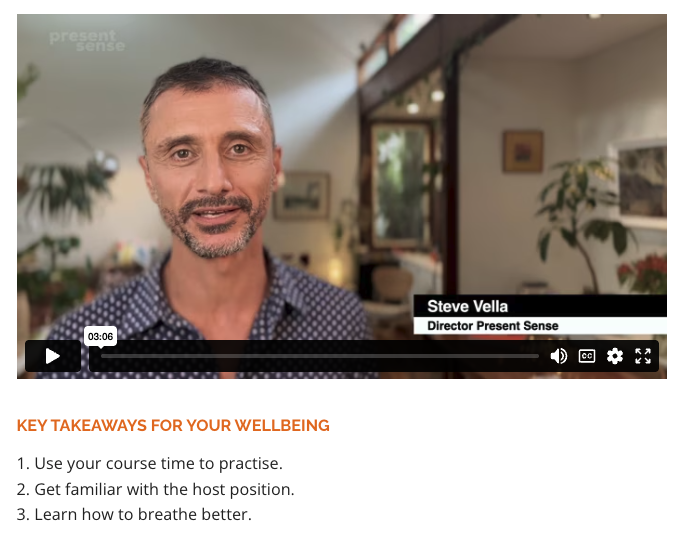Does mindfulness Really work?
The Science of Mindfulness
Watch this short video explaining some of the science behind what we do.
Can mindfulness help me?
Mindfulness has been shown through numerous peer-reviewed scientific studies to deliver health and performance benefits. These benefits include promoting wellbeing, managing pain, improving sleep, recovering from injury, managing anxiety, improving resilience and improving attention and focus. If health and recovery is your focus, it's important to note that mindfulness is not a replacement for medical treatment, if used as a complementary practice it could significantly improve your wellbeing or recovery.
How is this possible?
Leading health professionals and researchers such as Professor Craig Hassed from Monash University explain that our mind and body are connected. The interplay is surprisingly powerful. You may have heard of the 'fight or flight' response triggered in our body in moments of stress. When our body over-activates or over-sustains this response it can have very real negative short and long term impacts on our health and performance. These impacts can cause the body and mind further stress. Mindfulness can break the loop and bring it back into balance.
Wait, how does that really work?
When we encounter a stressful situation, for a while the 'fight or flight' response can make us hyper alert, stronger and faster. That's generally a good thing! The problem is that our body can activate this response for too long or when it isn't required. This is a problem particularly in today's world of hyperstimulation. Like we are 'living on adrenalin' as the saying goes.
Bruce McEwen, a neuroendocrinologist and Eliot Stellar, a physiological psychologist coined the term 'allostatic load' for this effect. It can have a chronic impact on our bodies through what is termed 'immune dysregulation'. In this state we become not only anxious and unfocussed, but also prone to coughs and colds, to infection, more susceptible to inflammation. It even affects blood pressure and thins our bones.
Elizabeth Blackburn, molecular biologist and biochemist, won a Nobel Prize for her work together with Carol Greider and geneticist Jack Szostak on understanding the function of telomeres. Telomeres are protective segments of DNA occurring at the ends of chromosomes. Elizabeth also showed how stress shortens them, making us less healthy and age faster, and how mindfulness and other factors can change that for the better.
The positive benefits of mindfulness were noted in scientific papers by Professor Kabat-Zinn in the 1970s and the body of research and evidence continues to grow
Can Mindfulness really help me or my team to perform better?
Mindfulness is embraced by leading performance coaches, business leaders and many others because it works! Present Sense techniques include some of those used by sports coaches, performers in the arts and elite defence force units. They aren't magic or a replacement for training and development in your field of endeavour. However they help to put you in a position in which you (and your team around you) can perform to your (and their) best.
How does mindfulness help me or my team to perform better?
It starts the same way that mindfulness improves your well-being. It breaks unhealthy fight or flight patterns which load your system and impact not only your health ongoing, but can impact your performance. The clarity mindfulness brings can help as you decide what to prioritise, how to approach challenges, and how to respond to unexpected results. It can prevent you doing something you regret! In addition, mindfulness builds greater self-awareness, which then helps you to better understand not only your own reactions to the world around you, but the impact you have on others. That can translate into improved resilience, superior focus, better team interactions, and ultimately into improved team work and performance.
Scientific studies have linked mindfulness to health benefits in many areas, including:
Pain Perception and Management
Reduced Inflammation
Enhanced Healing Processes
Stress Reduction and Hormonal Balance
Brain Plasticity and Pain Regulation
Enhanced Mind-Body Connection
Sleep
There is strong evidence that when properly practiced, mindfulness can deliver remarkable health and wellbeing benefits, improved focus, and enhance team or individual performance. This includes health benefits such as managing pain, recovering from injury and managing anxiety or stress. From a performance perspective that includes performing physically or mentally in any field of endeavour whether in industry, sport, defence, academia, teaching or the arts.
However, individual responses may vary and mindfulness should be viewed as complementary, and not as a replacement, for medical advice and care. If you're dealing with chronic pain or a specific health condition, talk to your healthcare professional before incorporating mindfulness into your wellness routine.
There is strong evidence that when properly practiced, mindfulness can deliver remarkable health and wellbeing benefits, improved focus, and enhance team or individual performance. This includes health benefits such as managing pain, recovering from injury and managing anxiety or stress. From a performance perspective that includes performing physically or mentally in any field of endeavour whether in industry, sport, defence, academia, teaching or the arts.
However, individual responses may vary and mindfulness should be viewed as complementary, and not as a replacement, for medical advice and care. If you're dealing with chronic pain or a specific health condition, talk to your healthcare professional before incorporating mindfulness into your wellness routine.
Copyright © 2025
Join our newsletter!
Stay Connected with Present Sense Receive updates, insights, and special offers that support your mindfulness journey. We send thoughtful content, no more than four times a year. We value your privacy—no spam, and we never share your details.
Thank you!
Steve Vella is the founder of Present Sense, a mindfulness-based wellbeing initiative. With a background in science, acting, and mindfulness practices, he blends evidence-based mindfulness practices with holistic approaches to personal transformation. His work focuses on helping individuals and organisations cultivate awareness, resilience, and balance. Passionate about integrating mindfulness into daily life, Steve shares practical tools for mental clarity and emotional wellbeing.
Dr. Sneha Wadhwani is a highly experienced GP with over 15 years in medicine. She is the Regional Clinical Director for NSW & ACT and National Clinical Director of Evoca Women’s Health, leading initiatives in women's healthcare. She also heads GP Wellbeing and practices at Bondi Junction Medical & Dental Centre, specialising in general medicine, occupational health, and women’s health. A lecturer at UNSW, she is passionate about medical education and empowering women’s health.
Set up your plan
We've made it easy for you to set up a CPD-compliant, quality assured plan with just a few clicks:
- Your personal wellbeing baseline using standardised survey
- Mindfulness techniques curriculum
- Masterclass on integration and application into patient care
- Assistance with selecting patients to participate
- Support with patient information and consent
- Guidance on what to measure and when to realise CPD points
All this is covered and included in the course*
*You will simply record patient confidential information in your medical system as you would normally according to the guidance on "what to measure when".
*You will simply record patient confidential information in your medical system as you would normally according to the guidance on "what to measure when".
PHASE 1
LEARN MINDFULNESS
Each module, you'll watch a short video lesson that introduces a mindfulness technique and shows how it can be used in everyday general practice. Then, it's time to put it into action!
You'll begin your personal mindfulness practice, by following the guided audio sessions we've prepared for you — coming up soon on the audio page.
What to Expect:
- Evidence-based mindfulness techniques
- Practical demonstrations
- Short exercises you can practise immediately

You’ll be encouraged to apply mindfulness as you watch—using guided breathing, posture awareness, and attention techniques.
PHASE 2
INTEGRATE INTO PATIENT CARE
You'll participate in a peer discussion and exchange to support you. Once you've identified suitable patients, you’ll begin applying simple mindfulness interventions into your consultations.
How to Apply Mindfulness in a Session:
- Micro-practices: Guide patients through short, simple mindfulness techniques
- Use the Supplied Resources: Access ready-to-use scripts & exercises to share
- Observe and adjust: Notice how the patient responds and tailor the approach
Each patient will respond differently—your role is to introduce techniques in a way that suits their needs.
PHASE 3
REPORT YOUR CPD MEASURED OUTCOMES
To ensure your CPD is recognised, you will document how mindfulness techniques impact your consultations.
How to Earn CPD Points:
- Use the CPD Tracking Template to record key insights
- Log how mindfulness impacts patient interactions over time
- Submit your outcomes for Measured Outcomes CPD accreditation
For us to review your submissions, please ensure that your final reporting and all required materials are completed by December 7th.
This structured approach ensures that your learning is not just theoretical—it has measurable outcomes in your practice.

